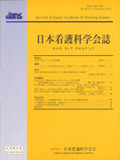Japanese
English
- 販売していません
- Abstract 文献概要
- 参考文献 Reference
要旨
目的:本研究は,悪性グリオーマ患者・家族が終末期の過ごし方を意思決定するための看護方略を明らかにすることを目的とした.
方法:悪性グリオーマ患者に関わる医療者30名(看護師27名・医師3名)を対象に半構造化面接を実施し,Grounded Theory Approachにおける継続比較分析法を用いて分析した.
結果:再発後から昏睡状態に陥るまでの「治療方針の立て直しにおける看護」の時期に看護師が用いている,〈医療者間で統一した意見を提示する〉〈情緒的なつながりを支持する〉〈療養場所移行後の生活のイメージ化を促進する〉〈療養場所移行後の生活の難しさを軽減する〉〈決定を後押しする〉の5つの看護方略が抽出された.看護方略の用い方は《患者・家族の現状認識の査定》によって変わることが明らかになった.
結論:看護師は,意思決定の主体は患者・家族であるということを常に尊重し,5つの看護方略を用いて支援していくことが重要である.
Abstract
Objective:The purpose of the present study was to identify nursing strategies that help malignant glioma patients and their families make decisions regarding how to spend their time at the end of life.
Method:Semi-structured interviews were conducted with 30 medical staff(27 nurses and 3 doctors) who cared for malignant glioma patients. Data were analyzed using the Constant Comparative Method of the Grounded Theory Approach.
Results:Five nursing strategies implemented by nurses in order to help patients and their families make effective decisions regarding how to spend their time at the end of life were identified. These strategies were applied when the treatment policy was revised during the period from recurrence to coma. The five nursing strategies were: offer the opinion of the medical staff involved; support emotional bonds; promote a positive image of life after shifting the location of medical treatment; reduce predicted difficulties in daily life after shifting the location of medical treatment; and support the family's decisions. Each nursing strategy reflected nurses' assessments of the recognition of the status quo by patients and their families.
Conclusion:Nurses should always respect the autonomy of patients and their families in making decisions, and it is important that nurses support this decision-making process with the five identified nursing strategies.
Copyright © 2010, Japan Academy of Nursing Science. All rights reserved.


